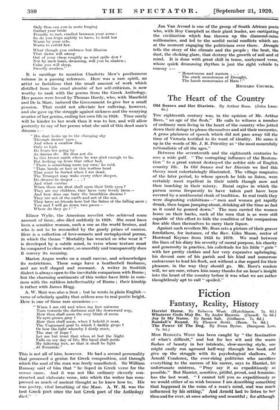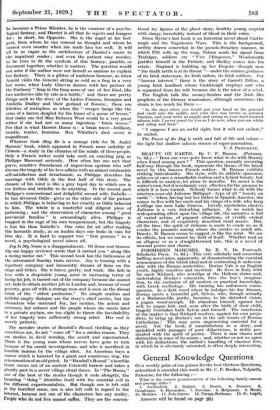Fiction
Fantasy, Reality, History
7s. 6d.)
MISS REBEC6A WEST has been caught by " the fascination of what's difficult," and but for her wit and the warm flashes of beauty in her intricate, slow-moving style; one might easily run aground half-way through her book and give up the struggle with its psychological shallows. As Arnold Condorex, the ever-rising politician who sacrifices everything to the success of his career, says. to Harriet, his unfortunate mistress, " Pray say it as expeditiously as possible." But Harriet, sensitive, pitiful, proud, and feminine, has the last word. " I cannot tell you as expeditiously as we would either of us wish because I am describing something that happened in the ruins of a man's mind, and was much influenced by his setting." And Arnold had to listen to her then and for ever, at once adoring and resentful ; for although
he becomes a Prime Minister, he is the creature of a psycho- logical fantasy, and Harriet is all that he rejects and hungers for : in short, his Opposite. She is the angel at his bed- post, from whom he can conceal no thought and whom he cannot even murder when she reads him too well. It will all be as vague as the architecture of Harriet's music to the impatient reader ; and even the patient may wonder, as he tries to fit the symbols of this fantasy, parable, or document together, whether it matters. The question would not arise if the author were not herself so anxious to explain her fantasy. There is a glitter of malicious humour, as when Arnold visits the General sitting as cold as a frog in a very hot room, when Lady Ginevra dances with her partner at the Embassy " limp in the limp arms of one of her kind, like two anchovies side by side in a bottle," and there are pretty things such as the story of the Ladies Frances, Georgina and Arabella Dudley and their garland of flowers ; there are felicities of metaphor, as when the " creeper hangs like the arms of a harem dangled for the kisses of a queue of lovers," that make one feel Miss Rebecca West would be a very great writer if she had not so many ingenious " brain waves." For that is what Harriet Hume is : a brain wave—brilliant, caustic, tender, feminine. Rex Whistler's dust cover is magnificent.
Whatever Gods May Be is a strange title for M. Andre Maurois' book, which appeared in French more suitably as Climats—a study in the climates of the minds of three people. Only a French writer could take such an exacting prig as Philippe Marcenat seriously. How often has one met that grave, sensitive Frenchman of impervious egotism who will discuss the tragedy of his love-affairs with an almost intolerable self-satisfaction and detachment, as Philippe describes his marriage with Odile in the first half of this story. The climate of his mind is like a grey tepid day in which one is too listless and irritable to do anything. In the second part Philippe's conventional and delightful second wife; Isabelle— he has divorced Odile—gives us the other side of the picture in which Philippe is behaving to her exactly as Odile behaved to him. The whole is a masterful and diligent piece of patterning ;. and the observation of character among " good provincial families " is astoundingly alive. Philippe is trapped in the cage of his own temperament, but the tragedy is less his than Isabelle's. One cries for air after reading this hermetic study, as on leaden days one looks in vain for blue sky. It is hard to 'support two " first persons " in a novel, a psychological novel above all.
Joy Is My Name is a disappointment. Of Sense and Sensua- lity one happy reviewer wrote that it carried you " along like a racing motor car." This second book has the listlessness of the attenuated Sunday train service. Joy is touring with a repertory company and innocently dreams of fame on the stage and riches. She is braVe, pretty, and weak: She falls in love with a despicable young actor in increasing terror of losing his job, is turned out of the company because she cannot act, fails to obtain another job in London and, because of cruel poverty, goes off with a strange man and is soon on the dismal brink of the " oldest profession." Its simple realism and faithful empty dialogue are the story's chief merits, but the characters who surround' Joy, her mother, the actors and actresses, her seducer and the people whom she meets later in a private asylum, are too slight to throw the inevitability of her tragedy into sufficiently strong relief. Her end is merely pathetic.
The macabre stories of Randall's Round; thrilling as they sometimes are, do not " come off " for a similar reason. They
are studies in devil worship, the occult and supernatural.
There is the young man whose nerves have gone to ruin because of his occult investigations, and who is sacrificed in horrible fashion by the village idiot. An American buys a manor which is haunted by a giant and murderous slug, the reincarnation of an old priest. In "Randall's Round" a horrible beast comes out of an ancient Cotswold barrow and takes a ghostly part in a secret village ritual dance. In "The Room," one of the best of the stories though it ends abruptly, the haunting " thing " identifies itself with the essential evil in the different .experimentalists. But though one is left cold in the horrified sense, one is also left cold in regard to the
interest, because not one of the characters has any reality. People who do not live cannot suffer. They are the conven-
tional lay figures of the ghost story, healthy young sceptics with slangy incredulity instead of blood in their veins. - - Donn Byrne's last book is an historical novel about Castle- reagh and the Napoleonic Wars. This is the background, swiftly drawn somewhat in the pseudo-Strachey manner, in which Pitt rolls up the map, Nelson sends his signal from Trafalgar, soldiers cry " Five 'Empereur," Wordsworth justifies himself in the Prelude, and Shelley comes into his estate. England is building up her Empire—though now " the death rattle is at its throat "—under the sinister guidance of its Irish statesmen, its Irish sailors, its Irish soldiers. For " human interest " there is the story of Garrett Dillon, a young Irish landlord whom Castlereagh employs and who is separated from his wife because she is the niece of a rebel.
The English talk like money-lenders and the Irish like prophets of the literary renaissance, although sometimes the strain is too much for them :-
" In the days when you would put your hand on the pommel and vault into the saddle, and your face was brown as autumn bracken, and your wrist as supple and strong as your steel-hearted salmon ;rods, I never cared for you as I do now, when you are white and ailing and frail."
" I suppose I am an awful sight, but it will not endure," he smiled.
The Power of the Dog is swift and full of life and colour— the light but shallow salmon stream of super-journalism.
V. S. Parrennyr,













































 Previous page
Previous page